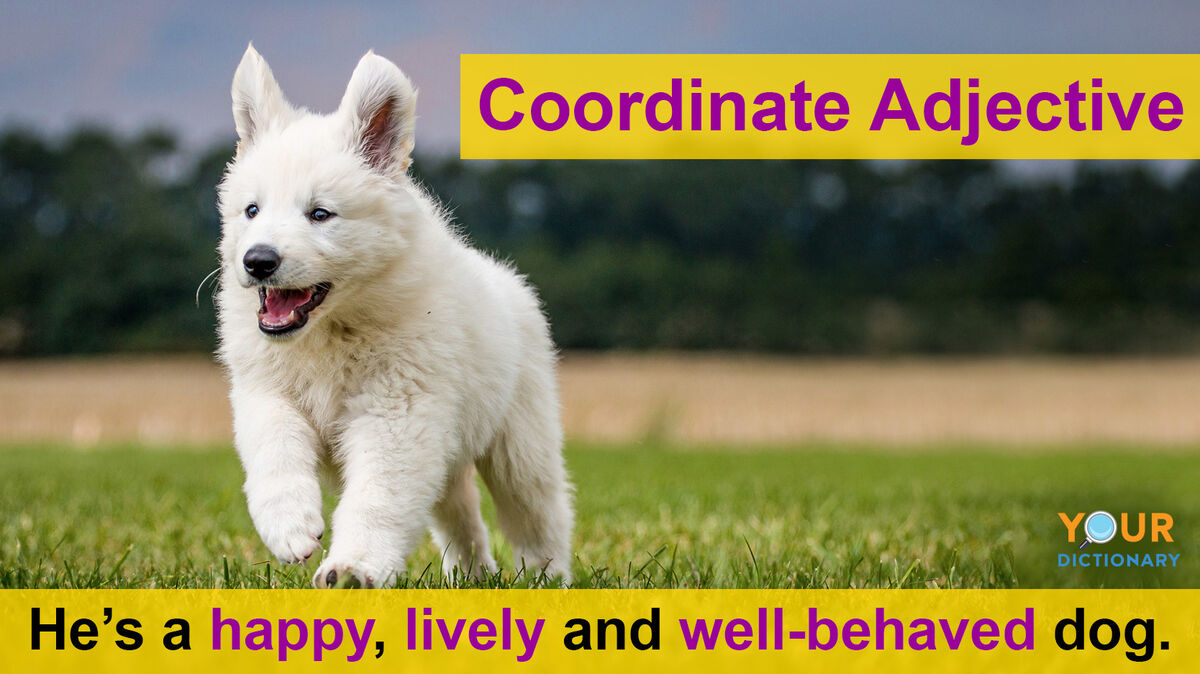
Coordinate adjectives are two or more adjectives that work together to modify the same noun. These adjectives are separated by the word “and,” or they're separated with commas. Learn more about coordinate adjectives and how they're used in different kinds of sentences.
How to Make Coordinate Adjectives
You may know that an adjective describes or modifies a noun. Examples of adjectives (in bold) modifying nouns (underlined) in sentences include:
- He's a happy dog.
- Melissa is so smart.
- What a thoughtful gift!
These adjectives help us know more about the dog, Melissa and the gift. But sometimes you want to describe your nouns in more detail. When you describe a noun with more than one adjective, you've formed a coordinate adjective.
- He's a happy and lively dog.
- Melissa is so smart and creative.
- What a thoughtful and generous gift!
Notice that each adjective describes a different part of the noun, but is equally important to the sentence. For example, a "happy and lively" dog is much different than a "happy and calm-tempered" dog. However, neither "happy" nor "lively" is a more important adjective than the other.
You can add more adjectives to a coordinate adjective as well. For example:
- He's a happy, lively and well-behaved dog.
- Melissa is so smart, creative and funny.
- What a thoughtful, generous and beautiful gift!
Each adjective helps you understand more about the noun. While you can technically add as many coordinate adjectives as you want, make sure not to overwhelm your reader with a long list of adjectives.
Punctuating Coordinate Adjectives
One of the trickier parts of coordinate adjectives is punctuation. Coordinate adjectives must be separated by either a comma or the word "and." You may have seen coordinate adjectives that look like this:
- We awoke to the sound of cheerful and perky songbirds.
- What a gratifying and productive day.
- Our mountain cabin was surrounded by a burbling and gurgling creek.
These sentences are all correct. So are these:
- We awoke to the sound of cheerful, perky songbirds.
- What a gratifying, productive day.
- Our mountain cabin was surrounded by a burbling, gurgling creek.
As long as both descriptors are independently modifying the same noun, you can choose between a comma or the word “and.” It depends on your preferred writing style and which version sounds best to you.
Punctuating Longer Coordinate Adjectives
When your coordinate adjectives include three or more words, separate them with a comma. You can choose between the word "and" or a final comma between the last two adjectives. For example:
- The rusty, creaking, spider-ridden, ugly tractor rotted away in their backyard.
- I'm resting in a heavenly, soapy, warm, and luxurious bath right now.
- We hesitated before heading down the creepy, narrow, poorly-lit path.
As with shorter coordinate adjectives, it's your personal preference to use "and" or a final comma in these longer lists. Check with your style guide if you choose to add an Oxford comma (a comma between the final adjective and the word "and") to your list, as some style guides would rather not include two commas in a list of three.
Coordinate Adjectives vs. Compound Nouns
Not every descriptor before a noun is serving as an adjective. Consider these examples:
- She loves to write with her red fountain pen.
- Can you stop by the downtown post office?
- Let's grill some foot-long hot dogs for the game.
"Fountain pen," "post office" and "hot dogs" are all compound nouns. You can add an adjective in front of these nouns to modify them, but they're not coordinate adjectives. For example, “red” is modifying the compound noun “fountain pen.” “Fountain” isn’t modifying “pen.”
If you’re uncertain if you’re working with coordinate adjectives, take the words in question and place “and” between them (such as "red and fountain pen" or "foot-long and hot dogs"). If it doesn’t make sense, the adjective is simply a descriptive adjective, not a coordinate adjective.
Coordinate Adjectives vs. Cumulative Adjectives
The order of coordinate adjectives isn’t set in stone. Rather, it’s subject to the writer’s preference. These adjectives can independently modify the noun and are, usually, of equal importance. For example, "He's a happy and lively dog" makes just as much sense as "He's a lively and happy dog."
On the other hand, the order of cumulative adjectives cannot be altered without changing the meaning of the sentence. Each cumulative adjective has an increasing level of importance as it gets closer to the noun. For example:
- We love to dance to our favorite country ballads. ("Our country favorite ballads" doesn't make sense.)
- Have you seen those three stray dogs? ("Those stray three dogs" doesn't make sense.)
- Let's stop by that new Italian gelato place. ("That Italian gelato new place" doesn't make sense.)
Changing the order of cumulative adjectives would not only change the meaning but also make the sentence appear illogical. These adjectives are dependent upon one another since both are needed to adequately modify the noun. Notice that you don't need commas between cumulative adjectives, which is not the case with coordinate adjectives.
Coordinated Descriptors
Coordinate adjectives are a great addition to our writing. They help us paint illustrative pictures readers will appreciate. To be sure you’re a master of the commas you'll need for creating coordinate adjectives, check out eight times commas were important. Keeping your comma game on point will help you paint those illustrative scenes with accuracy and clarity.